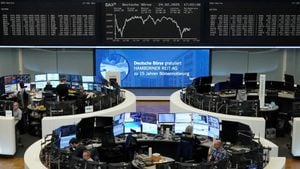The upcoming Bundestagswahl, set for February 23, 2025, marks an early election for Germany following recent political turbulence. Rosenheim and its surrounding municipality are gearing up for this important electoral event, which holds significant weight for the local community.
The election is particularly relevant for the voters of electoral district 221, which includes the independent city of Rosenheim and numerous nearby localities such as Bad Aibling, Wasserburg, and many others. With about 60 million eligible voters across Germany, the stakes are high as citizens prepare to cast their ballots.
The election had originally been scheduled for September but was pushed forward by several months due to the political crisis experienced over the past year. The adjustment reflects the government’s effort to maintain stability and engage voters during tumultuous times.
Voter participation is expected to mirror the strong turnout seen during previous elections. For example, the 2021 election saw participation reach around 80.6 percent, indicating strong civic engagement among Rosenheim’s residents. Daniela Ludwig from the Christian Social Union (CSU) won the previous election with 36.1 percent of the votes, followed by Victoria Broßart of the Greens, who secured 13.8 percent.
Voters are reminded to bring their voter notification cards, which will specify their polling locations—a requirement for those who do not utilize mail-in ballots. The election will still follow the traditional two-vote system, wherein individuals can cast their ballot for both local candidates and party lists.
Rosenheim’s electoral district comprises diverse communities, which all contribute to the political fabric of the region. The demographic makeup includes small towns such as Albaching and Bad Endorf, reflecting the diverse needs and interests of the voters. This year, each municipality's voting patterns will be closely monitored, with real-time updates available through interactive graphics and maps showing voting results as they come through on the election evening.
Media outlets will provide live coverage, allowing voters and political observers to track where each party resonates strongest among the different communities. This type of detailed analysis may help shed light on potential shifts within voter sentiment compared to previous elections.
Looking back to the last election, the distribution of votes shows the significance of local issues and candidates. For Rosenheim, the strongest party performances – the CSU, SPD, and Greens – have laid the groundwork for voter expectations this time around. With the current political climate, issues such as climate change, local economic development, and public services are expected to play pivotal roles during the campaigning phase leading up to February.
Experts believe these factors will shape voters' decisions significantly. Strategies will likely reflect how parties can address pressing local and national issues. The increasing need for responsive governance has become apparent, and it will be interesting to see how well the main parties adapt their messages to meet the concerns of voters.
Rosenheim's future will be influenced by the outcome of this election as citizens assess which candidates and parties will best address their needs. Given the unpredictability of politics, this election's results could signal broader trends across Germany.
On February 23, residents will not merely be casting votes; they will be expressing their hopes for the future, reflecting on their civic responsibilities, and actively contributing to their community's direction. Political engagement is more important than ever, and the upcoming election is set to be a defining moment for Rosenheim and beyond.



